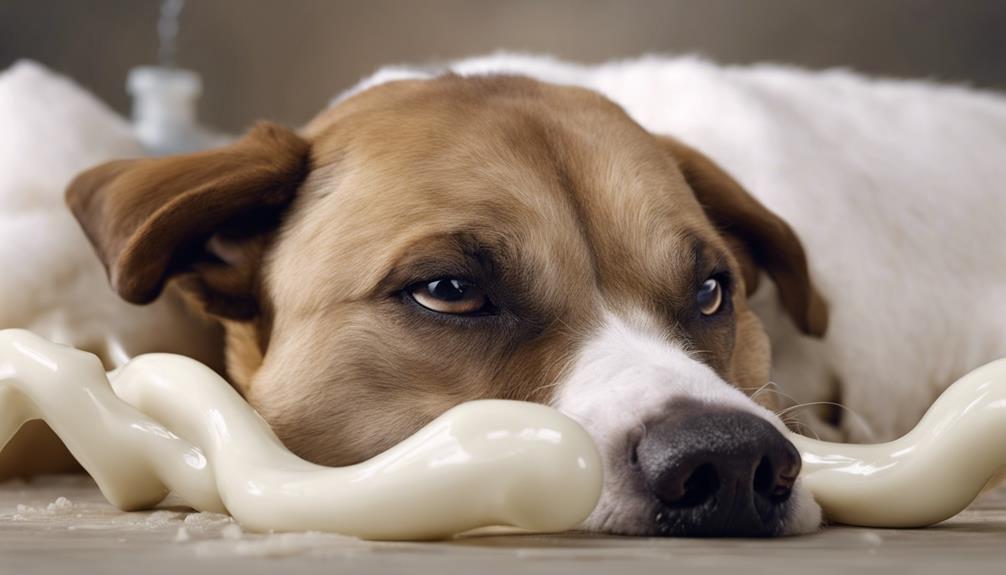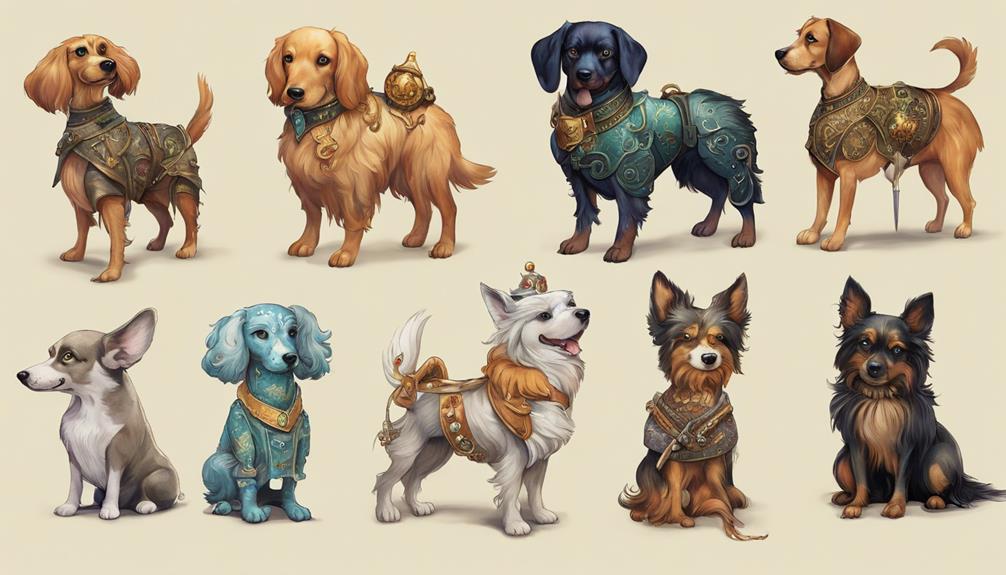Yes, dogs can have milk, but caution is necessary. Milk provides nutrients like calcium and protein in small amounts. It can be a delicious treat for some dogs, especially comforting in stressful moments. However, be aware of the risks. Dogs may have difficulty digesting lactose, which can lead to issues such as vomiting and diarrhea. The high fat content in milk could also contribute to obesity. Water and balanced food are safer choices for them. It is important to understand allergic reactions and symptoms of lactose intolerance. Safe alternatives like lactose-free milk or goat’s milk are available. For more insights on keeping your dog healthy and happy, click here.
Key Takeaways
- Milk can cause digestive issues in dogs due to lactose intolerance.
- Lactose-free milk and goat's milk are safer options for some dogs.
- Watch for signs of allergic reactions like itching, vomiting, or diarrhea.
- Water is the best hydration choice for dogs, avoiding unnecessary risks.
- Consult a vet before offering milk to dogs, especially if lactose intolerance is suspected.
Potential Benefits of Milk for Dogs
Milk can provide dogs with essential nutrients like calcium and protein in small amounts. For our canine friends, a few tablespoons of milk can be a revitalizing treat.
Some dogs enjoy the flavor of dairy and find it comforting, especially during stressful situations. Additionally, milk can offer hydration to our furry companions.
It's important to note that in moderation, milk can be advantageous for dogs who aren't lactose intolerant. This means that for some dogs, milk can be a source of necessary vitamins and nutrients.
Risks of Giving Milk to Dogs

It's crucial to exercise caution when considering offering dairy products to dogs due to potential health risks associated with lactose intolerance. Dogs are lactose intolerant, meaning their bodies struggle to digest lactose, the sugar found in milk. Giving dogs milk can lead to digestive issues such as vomiting, diarrhea, and gas.
The high fat content in milk can contribute to obesity in dogs, making it a less than ideal treat choice. Some dogs may even develop pancreatitis from consuming milk due to its high-fat content. Remember that dogs don't actually need milk in their diet to stay healthy.
To prevent potential health problems, offering water and balanced dog food as alternatives to milk is safer. By avoiding milk, you can help your furry friend stay happy and healthy without risking any adverse reactions.
Allergic Reactions to Milk in Dogs

Observing your furry companion closely for signs of allergic reactions is vital when considering dairy products in their diet. Dogs can have allergic reactions to milk, showing symptoms like itching, red skin, hair loss, vomiting, and diarrhea. These signs may indicate a milk allergy, which is a common food allergen for dogs. Even a small amount of milk can trigger these reactions in sensitive pups. Behavior changes such as excessive licking or agitation could also indicate a milk allergy in your dog.
If you notice any of these symptoms after your dog drinks milk, it's important to consult a veterinarian for proper diagnosis and treatment. Avoid giving your dog too much milk, as their bodies may not be able to tolerate lactose, leading to discomfort and health issues. Understanding how your dog reacts to milk can help you make informed decisions about their diet and maintain their well-being.
Lactose Intolerance in Dogs

Noticing symptoms like diarrhea, gas, vomiting, and abdominal discomfort in dogs can indicate lactose intolerance, a condition where they struggle to digest lactose commonly found in milk.
- Dogs can be lactose intolerant, making it challenging for them to digest milk.
- Symptoms of lactose intolerance in dogs include diarrhea, gas, vomiting, and tummy discomfort.
- As dogs age, they may lose the ability to produce lactase enzymes, worsening lactose intolerance.
- Giving milk to lactose intolerant dogs can lead to digestive issues and make them uncomfortable.
- If you suspect your dog is lactose intolerant, it's vital to consult a vet before offering any milk to prevent gastrointestinal upset.
Understanding lactose intolerance in dogs is essential for their well-being. Avoiding milk or providing lactose-free alternatives can help prevent discomfort and digestive problems. Always observe your furry friend for any signs of lactose intolerance and seek professional advice when in doubt.
Symptoms of Milk Allergy in Dogs

Symptoms of a milk allergy in dogs can manifest as agitation, red and inflamed skin, itchiness, licking paws, and vomiting and diarrhea. If your furry friend experiences discomfort like red, irritated skin or excessive licking after consuming milk, they might be allergic to it.
Agitation and gastrointestinal issues such as vomiting and diarrhea are common signs of a milk allergy in dogs. Keep an eye out for symptoms like itchiness, red skin, or digestive problems following milk consumption, as these could indicate a milk allergy.
Vomiting and diarrhea are key indicators of a milk allergy in dogs and may signal the need to steer clear of dairy products altogether. If you notice your dog exhibiting these signs, seeking guidance from a veterinarian for managing their milk allergy effectively is paramount. Remember, your pup's well-being is a top priority, so being aware of these symptoms is vital for their health.
Safe Alternatives to Milk for Dogs

When considering safe alternatives to milk for dogs, it's important to explore options like lactose-free milk specifically designed for canine consumption. While some dogs may be able to tolerate certain types of milk, many are sensitive to dairy and lack the enzyme lactase needed to digest lactose.
Here are some safe alternatives to traditional milk for dogs:
- Lactose-free milk: specially formulated for dogs, reducing the risk of digestive issues.
- Goat's milk: lower in lactose compared to cow's milk, making it a potentially easier option for some dogs.
- Water: the best and safest drink for dogs, ensuring proper hydration without the risks associated with milk.
- Almond milk: it isn't recommended for dogs due to potential allergies and stomach upset.
- Soy milk: like almond milk, it may not be suitable for all dogs and should be introduced in small quantities to adult dogs.
Recommendations for Dogs and Milk

When contemplating offering your dog milk, it's crucial to keep in mind that some dogs are lactose intolerant, which can result in digestive issues such as vomiting, diarrhea, gas, and abdominal pain.
It's recommended to consult with a veterinarian before introducing milk or dairy products to your dog's diet to avoid any potential discomfort.
Prioritizing water and balanced dog food over milk guarantees your furry friend's overall health and well-being.
Milk for Puppies
For puppies, the switch from mother's milk to a balanced commercial puppy food is crucial for their nutritional needs. When contemplating milk for puppies, it's important to keep in mind their delicate digestive systems. Here are some key points to ponder:
- Puppies should consume mother's milk for the first 6-7 weeks of life.
- After weaning, puppies should move to a balanced commercial puppy food for essential nutrients.
- Cow's milk isn't recommended for puppies due to the risk of lactose intolerance.
- Providing specially formulated dog milk or weaning formulas is a safer option than cow's milk for puppies.
- Adult dogs don't need milk in their diet as long as they've access to fresh water and a balanced dog food.
Lactose Intolerance in Dogs
Understanding a dog's potential lactose intolerance can guide responsible pet owners in making informed decisions about incorporating milk into their canine companion's diet. Dogs can struggle to digest milk due to a lack of lactase enzymes, leading to symptoms like diarrhea, vomiting, gas, bloating, and abdominal pain. While non-sensitive dogs may tolerate small amounts of milk as an occasional treat, it's crucial to consult a veterinarian before introducing dairy products to prevent digestive issues. Lactose intolerance becomes more common in adult dogs as their ability to digest lactose decreases with age. Being mindful of your dog's sensitivity to milk can help maintain their digestive health and overall well-being.
| Lactose Intolerance in Dogs | |
|---|---|
| Symptoms | Diarrhea, vomiting, gas, bloating, abdominal pain |
| Recommendations | Consult veterinarian before introducing dairy products |
| Occasional Treat | Small amounts for non-sensitive dogs |
| Adult Dogs | More prone to lactose intolerance |
Frequently Asked Questions
Is It OK to Give Milk to Dogs?
It's generally safe to give dogs milk in small quantities as an occasional treat. While milk isn't essential for their diet, providing a few tablespoons of cow's or goat's milk can be okay for non-sensitive dogs.
However, giving too much milk can lead to digestive issues like diarrhea, vomiting, and stomach upset. Keep an eye on your dog's responses to make sure they handle it well.
What Kind of Milk Can Dogs Drink?
We recommend offering dogs small amounts of cow's or goat's milk occasionally. A few tablespoons are fine, but avoid giving a whole bowl at once to prevent digestive issues.
Milk is high in fat and natural sugars, which can lead to obesity and pancreatitis. Overconsumption may cause diarrhea, vomiting, and loose stools.
It's essential to monitor dogs for lactose intolerance reactions. Always consult a vet before introducing new foods into your dog's diet.
Can I Give My Dog Human Milk?
We suggest avoiding human milk for dogs due to potential digestive issues caused by lactose intolerance. Instead, opt for dog-friendly alternatives that provide essential nutrients.
Human milk lacks the necessary components found in dog milk, leading to symptoms like diarrhea and vomiting in dogs. Protect your furry friend's tummy by steering clear of human milk and choosing suitable options for their well-being.
What Liquids Can Dogs Drink?
We should prioritize water for dogs as their main drink. It's the most important option for keeping them hydrated.
Small amounts of fresh fruit juice can be a nice treat for them.
Avoid giving dogs alcohol, tea, coffee, or artificial juices. Toxic beverages like grapes, hops, caffeine, and alcohol are dangerous for dogs.
Keeping dogs well-hydrated, especially in hot weather or during physical activity, is essential for their health and well-being.
Is It Safe for Dogs to Have Milk if They Can Eat Spinach Safely?
Many dog owners wonder about dogs and spinach safety, but what about milk? While some dogs can eat spinach safely, milk may cause digestive issues. Most adult dogs are lactose intolerant, so it’s best to avoid giving them milk. Stick to water and dog-safe snacks like spinach in moderation.
Conclusion
To sum up, while some dogs may enjoy milk, it's crucial to be cautious due to potential risks such as lactose intolerance and allergies.
It's advisable to stick to safe alternatives like lactose-free milk or water for hydration.
Keep in mind, every dog is different, so it's vital to consult with a veterinarian before introducing milk into your pet's diet.
Stay informed and prioritize your furry friend's health and well-being above all else.









